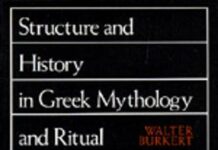
Ebook Info
- Published: 1998
- Number of pages: 238 pages
- Format: PDF
- File Size: 9.44 MB
- Authors: Walter Burkert
Description
The splendid culture of the ancient Greeks has often been described as emerging like a miracle from a genius of its own, owing practically nothing to its neighbors. Walter Burkert offers a decisive argument against that distorted view, pointing toward a balanced picture of the archaic period “in which, under the influence of the Semitic East―from writers, craftsmen, merchants, healers―Greek culture began its unique flowering, soon to assume cultural hegemony in the Mediterranean.”
User’s Reviews
Editorial Reviews: Review “Brilliant…[Burkert] is consistently thorough and challenging…Without denying the role of innate talent, he shows that much of the Greek miracle grew from an openness to influences from other cultures…[His] careful scholarship…has constructed the bridge that he set out to build.”―Carol G. Thomas, American Historical Review“An elegant and academically influential work…The Orientalizing Revolution can be enthusiastically recommended.”―Simon Hornblower, Times Literary Supplement“Burkert’s The Orientalizing Revolution remains an outstanding, or rather the outstanding, contribution to the question of `Near Eastern influence on Greek culture in the Early Archaic Age.”―Greece and Rome“This thought provoking work is an updated translation of Burkert’s Die orientlisierende Epoche in der griechischen Religion und Literature, 1984…It is refreshing to see a classical scholar follow in the footsteps of eminent Near Eastern scholars such as Cyrus Gordon and Michael Astour who have long argued for interconnections in the ancient Mediterranean world.”―Mark W. Chavalas, Near East Archaeological Society Bulletin From the Back Cover The rich and splendid culture of the ancient Greeks has often been described as emerging like a miracle from a genius of its own, owing practically nothing to its neighbors. Walter Burkert offers a decisive argument against that distorted view, replacing it with a balanced picture of the archaic period “in which, under the influence of the Semitic East, Greek culture began its unique flowering, soon to assume cultural hegemony in the Mediterranean”. Burkert focuses on the “orientalizing” century 750-650 B.C., the period of Assyrian conquest, Phoenician commerce, and Greek exploration of both East and West, when not only eastern skills and images but also the Semitic art of writing were transmitted to Greece. He tracks the migrant craftsmen who brought the Greeks new techniques and designs, the wandering seers and healers teaching magic and medicine, and the important Greek borrowings from Near Eastern poetry and myth. Drawing widely on archaeological, textual, and historical evidence, he demonstrates that eastern models significantly affected Greek literature and religion in the Homeric age. About the Author Walter Burkert was Professor Emeritus of Classics, University of Zurich. Read more
Reviews from Amazon users which were colected at the time this book was published on the website:
⭐First, let’s make clear what Burkert does NOT say. This book does not argue that the Greeks are an offshoot of some middle eastern civilization, or that Greek genius was merely a late and relocated flowering of Egyptian or some other oriental genius. Burkert in no way detracts from the greatness and the uniqueness of the Greeks.What he does is remove them from their isolation. He does this by showing a number of points where the Greeks, in the early Archaic Age, borrowed from the cultures around them or at least shared common beliefs or practices.The book is divided into three chapters, each organized around a class of people through whom East-West contacts occurred: craftsmen, seers / healers (workers in the sacred), and poets / singers. Burkert in each chapter reviews archaeological, literary and philological evidence for cultural contacts or “continuum”. And the evidence is not overwhelming, but it is considerable.The achievement of _The Orientalizing Revolution_ is not to knock the Greeks off their pedestal. It is to help us better understand the Greeks, by seeing some aspects of their culture in a broader light and by teaching us to apply insights from other lands and peoples to the Greeks. This makes Burkert a worthy heir to Jane Ellen Harrison, for instance, and well worth reading.
⭐People like to call Greece the “cradle of Western civilization”, but as this book shows, the Greeks themselves were substantially influenced by the civilizations of Southwest Asia (the “Middle East”) in the areas of language, art, literature, and other aspects of their culture. This book doesn’t make as radical an argument for Afro-Asiatic influence on Greece as did Martin Bernal’s “Black Athena” (which claimed, among other things, that 25% of ancient Greek words were of Semitic origin), but it is nonetheless a useful resource in challenging Eurocentrism.I can only name two flaws with the book, neither of them serious. First, its tone is rather academic and dry. Secondly, it concentrates on Greece’s archaic period. I would have like to see some discussion on how much influence, if any, Southwest Asia had on Greece in later periods (e.g. Classical or Hellenistic).Those minor caveats aside, I highly recommend this book for those interested in non-Eurocentric history.
⭐As always Burkert is timeless in his theories.
⭐Fantastic introduction into the assyrian/babylonian origin of Greece.
⭐Highly recommended.
⭐A wonderful piece of scholarship. He links important Greek material and the Epic of Gilgamesh. This in turn is linked to Winter’s work with parallel material in India. Death: A Hero’s Fate goes in more depth with some of the parallels.
⭐In this short volume, Walter Burkert sifts through literary and linguistic evidence with a fine-tooth comb, searching for Mesopotamian, Anatolian and Levantine influences on Archaic Greek culture, especially the writings of Hesiod and Homer.The books central position, that pre-Classical Greece was strongly influenced by Mesopotamia and Egypt, has been widely held for several decades, though it may come as a surprise to non-specialists.Burkert introduces the book with a historical account of the migrant culture of soothsayers, skilled craftsmen and poets from the Near East who traveled the Mediterranean. He then puts numerous cases of arts of letters under his microscope, establishing modest but persuasive parallels between motifs. Gilgamesh and Enuma Elish receive extensive comparison with the Iliad and Odyssey, and he makes many other salient comparisons besides.In his conclusion, he refers to the preceding matter as “a long and often torturous investigation,” and he is not wrong. I was disappointed but not surprised that he wrote this book in his usual tone-deaf style, giving the impression of an active hostility toward elegance or beauty, as though such qualities would spoil the science of the enterprise.I was frequently genuinely baffled by the great effort he expended to analyze incidental tropes or symbols, while ignoring some of the most persuasive and well-established evidence. The obvious Mesopotamian influence on figure sculpture receives scarcely a single notice (!), nor does the clear similarities evidenced by Enuma Elish and Hesiod’s Theogony. He passes the myths and icons of Heracles by in silence; material of which he himself observed “Oriental motifs have obviously entered this complex,” in his Greek Religion.The book was at times illuminating but was studiously unconcerned with making a larger point about the significance of historical interplay between Greece and the Near East. Burkert’s intellect is ever alive to minutiae, but his heart seems strangely dead in the face of splendid images of great vitality and significance. I can’t comprehend how one could apply one’s intellect so coldly to this splendid body of material, or why one would want to.
⭐This is a great book. Due to a number of trends in scholarshipon ancient history over the last two or three hundred years, thehistory of ancient Greece has been grossly distorted. The Near Eastern origin of much of the culture of ancient Greece was a recognized reality in ancient times. Until modern times, the foreign origin of ancient Greece according to ancient sources continued to be acknowledged, but that trend changed with the advent of the European nationalistic tendencies of the eighteenth century, which began increasingly to highlight Greece as the “cradle of civilization.”However, over the last sixty years, these prejudices have undergone a barrage of new findings. It appears that the ancient sources were correct. Walter Burkert, one of the foremost scholars of this century on the culture and religion of ancient Greece, examines the process by which Greece came to be imparted, in fact inundated, with Near Eastern cultural elements. Burkert’s is now one of several books which should transform of conception of Greek civilization. I would also recommend the more detailed “The East Face of Helicon” by M. L. West, and “Alien Wisdom” by Arnoldo Momigliano…
⭐As a Greek student in school / University I never had the chance to be informed as to the wealth, differentiation and the immensity of opinions, that historiography reserved for the Ancient Greek studies. It seems whatever we take for granted as a solid, one dimensional past, is a product of forgotten ideological battles and uncountable modifications / alterations. Therefore it is not a surprise that the origins of the Greek indigenous populations and of the Greek civilization are currently placed by the Greek historiography even further in an unknown past, and consequently the idea of a “pure” ancient Greek civilization which owns nothing to its neighbors, gains popularity once more.
Keywords
Free Download The Orientalizing Revolution: Near Eastern Influence on Greek Culture in the Early Archaic Age (Revealing Antiquity) in PDF format
The Orientalizing Revolution: Near Eastern Influence on Greek Culture in the Early Archaic Age (Revealing Antiquity) PDF Free Download
Download The Orientalizing Revolution: Near Eastern Influence on Greek Culture in the Early Archaic Age (Revealing Antiquity) 1998 PDF Free
The Orientalizing Revolution: Near Eastern Influence on Greek Culture in the Early Archaic Age (Revealing Antiquity) 1998 PDF Free Download
Download The Orientalizing Revolution: Near Eastern Influence on Greek Culture in the Early Archaic Age (Revealing Antiquity) PDF
Free Download Ebook The Orientalizing Revolution: Near Eastern Influence on Greek Culture in the Early Archaic Age (Revealing Antiquity)




